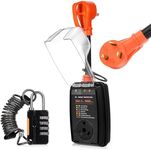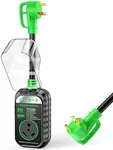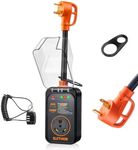Buying Guide for the Best Rv Surge Protector 30 Amp
Choosing the right RV surge protector is essential for protecting your RV’s electrical system from unexpected power surges, voltage fluctuations, and wiring issues at campgrounds. A 30-amp surge protector is specifically designed for RVs with a 30-amp electrical system, which is common in many travel trailers and smaller motorhomes. When shopping for a surge protector, it’s important to understand the key features and specifications so you can select one that matches your RV’s needs and provides reliable protection.Surge Protection Rating (Joules)The surge protection rating, measured in joules, tells you how much energy the device can absorb before it fails. Higher joule ratings mean better protection against large surges, such as those caused by lightning or power grid issues. For light, occasional use, a lower joule rating may suffice, but for frequent travelers or those staying in areas with unstable power, a higher joule rating is recommended. Consider your travel habits and the likelihood of encountering power surges when choosing the right level of protection.
Electrical Compatibility (30-Amp)This spec refers to the maximum current the surge protector can handle, which should match your RV’s electrical system. A 30-amp surge protector is designed for RVs with a 30-amp power supply. Using the correct amperage is crucial for safety and proper operation. Always check your RV’s power requirements and never use a surge protector with a lower amp rating than your RV needs.
Protection FeaturesSome surge protectors offer basic surge protection, while others include additional features like protection against low/high voltage, open ground, open neutral, and reverse polarity. These extra features help guard against a wider range of electrical problems that can damage your RV’s appliances. If you often camp at older or less reliable campgrounds, choosing a surge protector with more comprehensive protection features is a smart move.
Display and IndicatorsMany surge protectors come with LED indicators or digital displays that show the status of the power source and alert you to wiring issues or faults. Simple models may have just a few lights, while advanced ones provide detailed information. If you prefer easy-to-understand feedback or want to quickly diagnose electrical problems, look for a model with clear and informative indicators.
Portability and Weather ResistanceSince surge protectors are often used outdoors, their size, weight, and ability to withstand weather are important. Some are compact and easy to store, while others are bulkier but may offer more features. Weather-resistant or waterproof models are ideal for outdoor use, especially if you camp in rainy or humid environments. Think about where and how you’ll use the surge protector to decide which design best fits your needs.
Locking and Security FeaturesSome surge protectors include locking brackets or security features to prevent theft when used at public campgrounds. If you’re concerned about leaving your surge protector unattended, look for models with built-in locking options or the ability to secure them with a cable lock.











